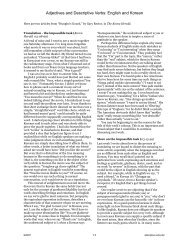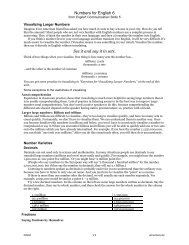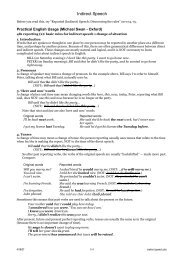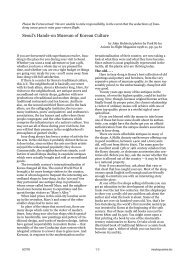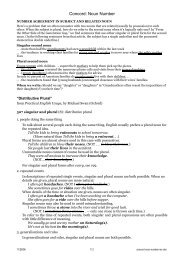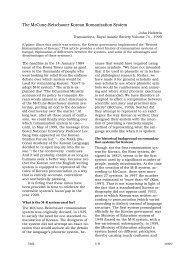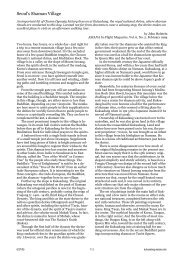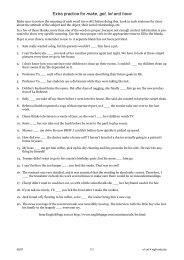Oral Presentations (International English Skills 1 ... - Korea Mosaic
Oral Presentations (International English Skills 1 ... - Korea Mosaic
Oral Presentations (International English Skills 1 ... - Korea Mosaic
You also want an ePaper? Increase the reach of your titles
YUMPU automatically turns print PDFs into web optimized ePapers that Google loves.
• Avoid the monotonous drone. A presentation that is delivered in a monotone is both 1) difficult to<br />
understand and 2) very annoying. Put life into your voice. You can do this only if you know the content<br />
well and if you talk to individuals, not the audience.<br />
Here are some excerpts from Clear Speech (Judy Gilbert, Cambridge University Press):<br />
There is some research evidence suggesting that [in their memory] native speakers sort vocabulary according<br />
to stress patterns. When the wrong pattern is heard, the listener may spend time searching stored words in the<br />
wrong category.<br />
<strong>English</strong> speakers use pitch patterns to identify words, so ignoring this part of pronunciation is a serious<br />
error.<br />
Intonation is used for 1. Dividing speech into thought groups [and] 2. Highlighting focus of meaning.<br />
...Intonation is the framework within which speech flows most clearly from speaker to listener. Each language<br />
has special ways to mark thought groups, but in <strong>English</strong> the chief marker is intonation... Here’s an example:<br />
“John,” said the boss, “is stupid.”<br />
That has a very different meaning from this sentence, using the same words:<br />
John said, “The boss is stupid.”<br />
...Of course, speaking isn’t like writing. We don’t use parentheses or other punctuation when we’re<br />
speaking. In fact, punctuation was invented to try to show some of the things we do in speech to separate<br />
groups of words. Written language substitutes punctuation for the spoken signals of intonation. The <strong>English</strong><br />
listener depends on these intonation signals in order to understand clearly.<br />
1. Content words are stressed more than function words (prepositions, articles, etc.), because content words<br />
carry more meaning. However, when function word carries special meaning for the sentence, stress it. The<br />
most important words are often the focus of intonation. They are usually emphasized by a pitch change,<br />
and this should be your signal of importance. Content words, like nouns and verbs, are usually the focus of<br />
information.<br />
2. When there are contrasting items in a sentence, each contrasting item is stressed more than other words.<br />
3. Emphasis on the focus word highlights the contrast between new and old information. All languages have<br />
one or more ways to show this difference, but <strong>English</strong> relies on intonation for this purpose more than most<br />
of our students’ languages. [End of excerpts from Clear Speech.]<br />
Examples of how intonation changes meaning<br />
The basic pattern for <strong>English</strong> is medium (2), then high (3) just before the end (3), then low (1) at the very end.<br />
The basic pattern applies even with added words.<br />
3 ho<br />
2 I went o<br />
1 me<br />
3 sto<br />
2 John went to the<br />
1 re<br />
Emphasis changes intonation (a function performed in <strong>Korea</strong>n with the josa); the word in focus gets the<br />
higher pitch.<br />
Did Bill go to the store<br />
3 John<br />
2 No,<br />
1 went to the store<br />
Why didn’t you go to the store<br />
3 went<br />
2 But I<br />
1 to the store<br />
8/30/07 8/ 18 e6_e5wbunit4-web.doc




